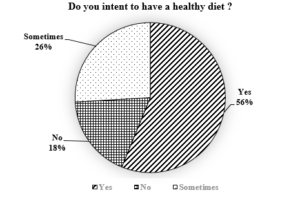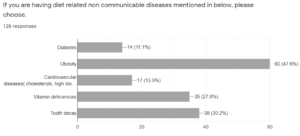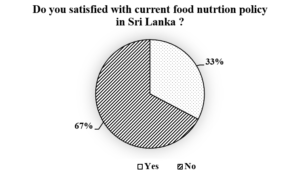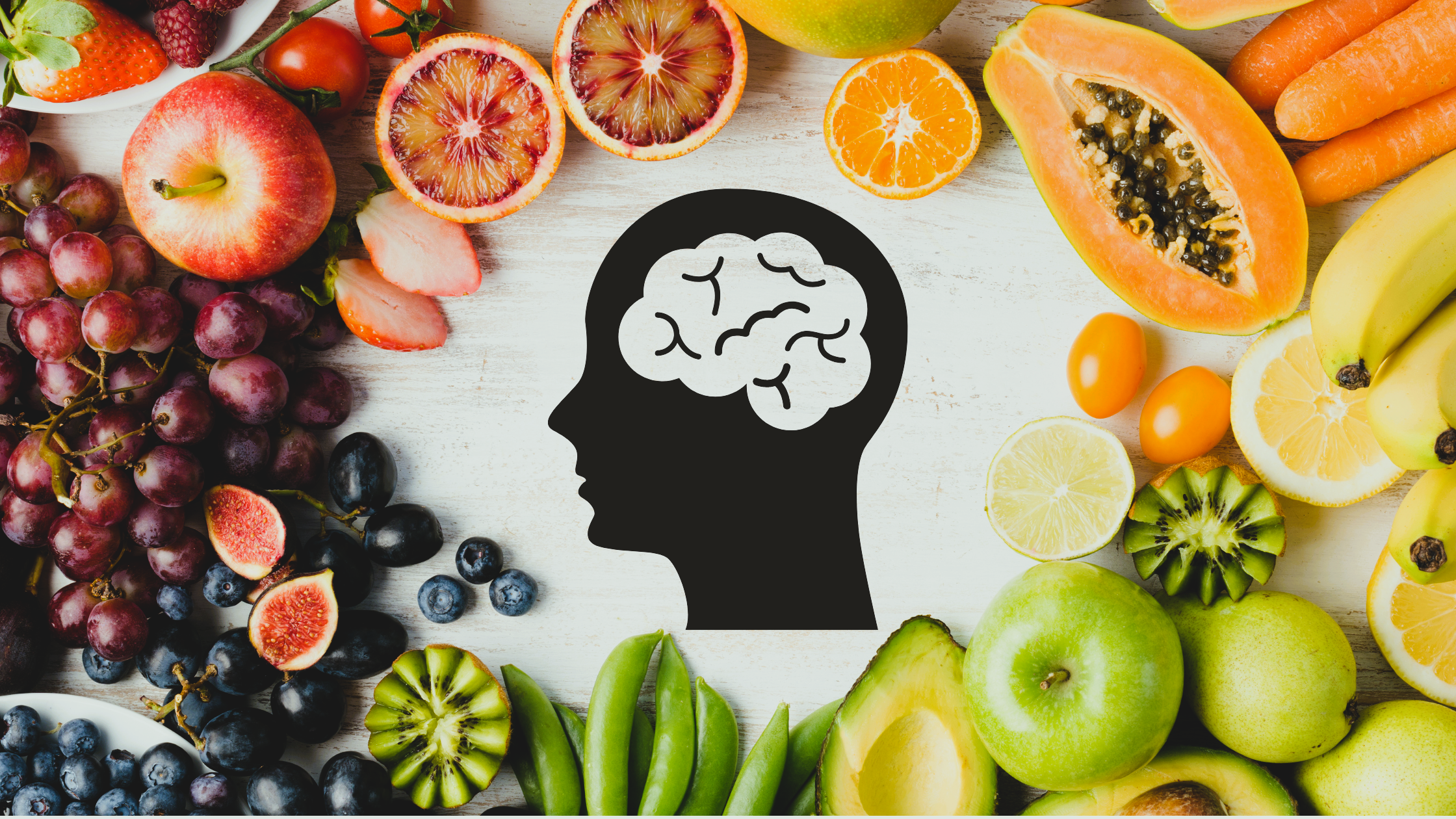Abstract:
Food nutrition and diet play pivotal roles in maintaining good health and preventing Non-Communicable Diseases (NCDs). Environmental factors, such as the availability and types of food, dietary patterns, and appetite, can largely influence people’s dietary behaviors and nutritional attitudes. Poor eating habits, such as overeating and unhealthy dieting, have been identified as significant risk factors towards nutrition-related non-communicable diseases in Sri Lanka.
The objectives of this study were to assess the respondents’ knowledge and attitudes towards food nutrition, as well as their dietary patterns, nutrition-related NCDs, and satisfaction with Sri Lanka’s current food nutrition policy.
The results of this research highlight the need to increase nutritional education and promote a healthy diet and dietary patterns among Sri Lankans. It is essential to develop policies in collaboration with the Ministry of Health and Education to control nutrition-related issues in Sri Lanka. As such, this study promotes the significance of proper nutrition and encourages Sri Lankans to make informed and healthier food choices.
Keywords: Food nutrition; Diet; Knowledge; Attitude; Non Communicable Diseases (NCDs); Survey
Introduction
Food nutrition is a critical part of health and development. Better nutrition is related to improved infants, child and maternal health, strong immune systems, safer pregnancy and childbirth, lower risk of Non Communicable Diseases (NCDs) such as diabetes, cardiovascular disease, obesity and longevity. Continuous exposure to the unhealthy diets eventually makes people more vulnerable to NCDs. This has become one of the major challenges nowadays, as NCDs are the leading cause of death and disease burden globally [1]. Currently, in Sri Lanka, the prevalence of NCDs is becoming greater than that of infectious diseases, and it has become the largest contributor to disease burden in the country. According to the World Health Organization (WHO), unhealthy diets are one of the major risk factors which are responsible for NCDs [2]. People with adequate nutrition are more productive and can create opportunities to gradually break the cycle of poverty hunger. Today the world faces a double burden of malnutrition that includes both under nutrition and overweight.
Literacy rate of Sri Lankans is 91% and 93% among males and females respectively. Sri Lanka has a large working population with 25 to 54 year old individuals dominating the country [3]. Around 42.6% of the total population is in this productive age group. According to the reports of WHO in 2018, NCDs such as cancer, chronic respiratory diseases, cardiovascular diseases and diabetes, are estimated to account for 83% of all deaths in Sri Lanka. This nutrition statistics indicate problems associated with low quality food intake and unhealthy dietary patterns in Sri Lanka. Studies suggest that in addition to the knowledge for maintaining good health practices, nutritional status is affected by positive attitudes and practices. Dietary patterns of Sri Lankans are highly influenced by many environmental factors such as unhealthy foods, which contain food with high salt content, high sugar content, high trans fatty acids, saturated fat and by sedentary life style. Unhealthy diets often consist of several processed or fast food that provide more calories from fat, saturated fat, trans fat, sodium and added sugars. Therefore, those foo are less nutritious [4]. Despite a modest consumption of fat, peoples consume a higher percentage of saturated fats in their diet compared to unsaturated fat. The ratio of higher saturated fat to unsaturated fat is an important risk factor for the development of cardiovascular diseases. Despite the availability of an abundance and variety of fruit in Sri Lanka, the average consumption is found to be inadequate. Due to varied agricultural climatic regions, both temperate and tropical fruits and vegetables are grown in Sri Lanka. In addition, coconut and fisheries are also among the top industries in Sri Lanka, as they are greatly advocated by the country’s island status. Nevertheless, domestic production of pulses and dairy products fails to meet the current demand. Hence, Sri Lanka has to depend heavily on imports, especially red lentils and milk powder. The general population has access to food from subsistence farming to various supply chains such as supermarkets, grocery stores, market vendors, etc. In Sri Lanka economic development, urbanization, shift in occupational structure, more young generation entering the workforce, emergence of processed food companies and recent technology innovation have resulted in changes in food consumption patterns. At the initial phase of the above changes, people move away from a staple diet to a more diverse, high value diet comprised of animal source food, dairy, fruits, vegetables, and fat and oil. Changes in dietary patterns in Sri Lanka, consumption of healthy versus unhealthy food, according to the guidelines for a healthy diet provided by the, healthy food items are fruits, vegetables, legumes, nuts and whole grains. Fruits and all animal source food except dried fish are found to be luxury commodities. Amongst all macro nutrients that provide energy, proteins are the least accessible nutrient to Sri Lankans [5]. Therefore, imbalanced nutrient intake with more carbohydrates and fats, but fewer proteins can be expected. The staple food in Sri Lanka is rice served with several curries made with lentils, vegetables, and fish or meat (mostly chicken). Many Sri Lankans are accustomed to have rice for each main meal, whereas for breakfast, rice can be replaced with bread, hoppers, string hoppers, lentils such as gram, green gram, etc. Coconut is also a fundamental food commodity in Sri Lanka because it is an essential ingredient in making dishes. Therefore, Sri Lankan cuisine is highly dominated by cereals, lentils, vegetables, coconut, and fish or meat. A healthy diet should contain less than 10% of the total energy intake from free sugars, less than 30% of the total energy intake from fats and less than 5g of salt.
Nutrient deficiencies are a public health problem in Sri Lanka. Achieving food security is a major challenge due to unhealthy dietary patterns. Nutrition related knowledge and attitude are necessary for dietary changes towards a healthier dietary pattern. For that reason, food and nutrition related knowledge, attitude and practice is one of the key factors to achieving household food and nutritional security.
On the other hand, food insecurity is a global problem that contributes to poor health and nutritional deficiencies. It can affect health either directly or indirectly through nutritional status as indicated by under nutrition or over nutrition and it is related to macronutrients and micronutrient deficiencies and lack of dietary diversity [1]. The significant positive correlation between nutritional knowledge, attitude is most important. And it will indicate that self-awareness regarding serious nutritional problems and knowledge regarding micro nutrition deficiencies. The importance of including vitamin rich food in the diet, maintaining a balanced diet, and an understanding of good nutrition and food preparation resulted in better nutritional levels [6]. It is well known and documented that diet and nutrition, physical activity levels and lifestyle play an important role in maintaining health and preventing diseases. Better dietary pattern and good health based on proper nutrition, enough sleep, proper stress management, good digestion, absorption and assimilation of nutrients, proper defecation. And also optimal levels of salts and micro elements, balanced levels of essential lipids, good regulation of the metabolism of sugars, proper hydration, adequate levels of vitamins. And also balanced levels of hormones such as epinephrine, thyroxin, oestrogen and androgen good cardiovascular function and proper functioning of the kidneys, bladder and the immune system is important in maintaining our health[7].
However, all consumers do not have access to sufficient, safe, and nutritious food. Rising prices, income inequalities, urbanization, and changes in lifestyle patterns visible in Sri Lanka are becoming detrimental to ensure a healthy living. Driven by aforementioned circumstances, Sri Lanka has witnessed a nutritional transition which leads to under nutrition, overweight, and obesity. Nutrition knowledge may influence the dietary behavior directly or through nutrition attitudes. Dietary behavior may further become dietary patterns and influence one’s nutrient intake. Therefore, understanding people’s nutrition knowledge, attitudes, and behavior is the basis for nutrition education.
Results & Discussion
The questionnaire was developed by Google Forms website. And then individuals responses were collected and analyzed. This was the link which I have sent to participants for the online survey questionnaire, https://forms.gle/xACSr2pScwdjibSs9. The questionnaire was divided into four sections (A, B,C and D), including 30 questions in total. All questions were multiple choice questions and Yes / No statements questions. The questions were listed as follows:
A. Socio demographic profile – Age, Sex ( 2 questions )
- What is your gender? ( Female, Male)
- How old are you ? (Under 18 years, 18-24 years, 25-30 years, Over 30 years)
B. a) The Food Nutrition Knowledge and Attitude section aims to assess individuals’ understanding of food nutrients and how much of each food item should be consumed, as detailed in the provided tables. ( 20 questions )
3. Do you possess knowledge regarding food nutrition and the link between unhealthy dietary patterns and non-communicable diseases? (Yes, No, Maybe)
4. Do you intent to have a healthy diet? (Yes, No, Sometimes)
b) What is your knowledge on the recommended quantity on consumption of the following food in terms of food nutrition: should people be increasing, maintaining, or decreasing their intake?
5. Fruits
6. Food and drinks with added sugar
7. Vegetables
8. Fatty foods
9. Processed red meat
10. Whole grains
11. Salty foods
12. Water
c) Please choose your attitudes about food nutrition and diet.
13. Soft drink consumption with fast food?
14. Do you add sugar to your drinks?
15. Homemade meals are more healthier than commercial food?
16. Do you take nutrition supplements?
17. Do you consume fruit as a snack?
18. Skimmed milk is more nutritious than whole milk.
19. Do you choose baked, steamed or grilled options when available, rather than fried food? (Yes, No)
- How often do you take dairy products with your daily meals? (Every meal, Twice a day, One a day, Not every day)
- Would you say that you prefer eating vegetables and fruits in their raw form, such as in salads or fresh cuts, as opposed to cooked dishes? (Yes, No, Sometimes)
- Are you concerned about food labels ( nutrition facts and ingredients ) when you buy food products? (Always, Sometimes, Never)
C) Factors that lead to increase country’s non communicable diseases through unhealthy food patterns and behaviors ( 5 questions )
23. How many meals do you usually eat per day? (1 meal, 2 meals, 3 meals, more than 3 meals)
24. What do you usually eat for your main meal? ( Mostly rice and curry, Only rice and curry, Different choices)
25. If you usually skip meals, which meal is it? (Breakfast, Lunch, Dinner, Never)
26. What is your reason for skipping meals? (Education pressure, Working pressure, It’s a habit, Away from family, Never skip meals, Other)
27. If you are having diet related Non communicable diseases, please choose from the below. (Diabetes, Obesity, Cardiovascular diseases, Vitamin deficiencies, Tooth decay)
D) Participants knowledge and attitude towards current food nutrition policy in Sri Lanka. ( 3 questions )
28. Are you satisfied with the current food nutrition policy in Sri Lanka? (Yes, No)
29. What do you think as the most effective way to improve food nutrition policy? ( There was four multiple choice answers)
30. If you want to carry out promotional activities on food nutrition, what do you want to know? (Food nutrition knowledge, How to get prevented from Non communicable diseases caused by unhealthy food, Dieting)
According to responses, more than half of respondents intended to have a healthy diet. A total of 91 (56%) of respondents have healthy diet and 42 (26%) of respondents take a healthy diet sometimes. And a total of 29 (18%) respondents do not intend to have a healthy diet according to Figure 1.

Figure 1 Respondents intention to have a healthy diet
According to Figure 12, it shows that total respondents of 60 ( 47.6%) have obesity, which is almost half of responses while a total of 14 (11.1%) have diabetes and total of 17 (13.5%) respondents have cardiovascular diseases like cholesterol and high blood pressure. A total respondents of 35 (27.8%) and 38 (30.2%) have vitamin deficiencies and tooth decay respectively as shown in the Figure 2.

Figure 2 Diet related Non Communicable Diseases (NCDs) of respondents
In the fourth section of the questionnaire, the questions were based on respondent’s knowledge and attitude to current food nutrition policy in Sri Lanka. In the forth section, there were three questions.
First question was respondents’ satisfaction about current food nutrition policy in Sri Lanka. According to Figure 3, more than half of total respondents, 109 (67%) aren’t satisfied with current food nutrition policy in Sri Lanka while 53 (33%) of total respondents are satisfied about current food nutrition policy in Sri Lanka.

Figure 3 Respondents satisfaction of current food nutrition policy in Sri Lanka
Second question was based on the most effective way to improve food nutrition policy in Sri Lanka. The answers were listed as follows :
- Government should strengthen laws related to supervision and punishments for unhealthy food producers and sellers.
- Raise public awareness on the authenticity of food and healthy food.
- Improve food nutrition knowledge and attitude of communities in the context of consumption of fast food lead to health issues.
- Raise awareness on the benefits of having a proper nutritional diet.
Majority of respondents 57 (35%) are of the opinion that food nutrition knowledge and attitude of communities should be improved by teaching them awareness about fast food consumption and its related health issues. According to Figure 4, it shows that 56 (34%) of total respondents want government to strengthen supervision and punishment for unhealthy food producers and sellers. A total respondents of 53 ( 32%) wish that public are taught to identify the authenticity of food and raise the public awareness to have healthy food as shown in Figure 4. And 41 (25%) of total respondents are of viewpoint that the public should be taught about a proper nutritional diet which leads a healthy lifestyle.

Figure 4 Respondents thought of effective way to improve food nutrition policy
The aim of the research was to investigate food nutrition knowledge of participants as well as their attitudes to food nutrition knowledge and dietary patterns. Participants’ understanding on nutrition-related non communicable diseases and their satisfaction of current food nutrition policy in Sri Lanka were also investigated. According to the responses, Sri Lankans have the knowledge of food nutrition and they have the knowledge and attitude about consuming unhealthy food lead us to have non communicable diseases. According to the survey responses, people are not satisfied with current food nutrition policy in the country.
The aim of the research was to investigate food nutrition knowledge of participants as well as their attitudes to food nutrition knowledge and dietary patterns. Participants’ understanding on nutrition-related non communicable diseases and their satisfaction of current food nutrition policy in Sri Lanka were also investigated. According to the responses, Sri Lankans have the knowledge of food nutrition and they have the knowledge and attitude about consuming unhealthy food lead us to have non communicable diseases. According to the survey responses, people are not satisfied with current food nutrition policy in the country.
Conclusion
It is noteworthy that non communicable diseases constitute a major public health challenge threatening the well-being of people and sustainable development of Sri Lanka. In that context, the findings of this research showed a significant impact of the frequency of consumption of different types of nutrients on the risk for development of non communicable diseases. The ideas from the theory of reason action have facilitated the academic foundation that supports the idea that people are responsible for their personal health and well being. Therefore, the consumer is responsible for their dietary choices. People can continue to obtain nutrition information from knowledgeable sources to increase awareness on food nutrients. The Mediterranean diet has been identified as the optimal for the prevention of non-communicable diseases and maintaining good health.
Savindi Kaushalya Edirisinghe
(Savindi Kaushalya Edirisinghe is currently reading her MSc majoring Chemical Engineering and Technology at Zhejiang University of Science and Technology. She has successfully completed my BSc in Food Science and Engineering with a first class honors at the same university in Hangzhou, China. She is writing articles in her research areas, further she has trained at Fonterra Brands Lanka (PVT), Sri Lanka as a trainee in R&D and In-plant laboratory. In fact those she also have certified in several language levels and has completed a diploma in Information Technology. From all of these she is sharing her knowledge through interesting articles is different areas which she has working on.)
Photo credit – https://www.hcbh.org/blog/posts/2022/april/cultivating-mental-health-how-to-improve-your-mental-health-through-nutrition/
References
- Wellness Sri Lanka. Non Communicable Disease. Available online at: http://wellnesssrilanka.com/ncd.html
- NCD global monitoring framework indicator definitions and specifications. Geneva: World Health Organization; 2014.
- Sri Lanka. Institute of Health Metrics and Evaluation 2016, Available online at; http://www.healthdata.org/sri-lanka.
- Sri Lanka Nutrition Profile Global Nutrition Report, Available online at; https://globalnutritionreport.org/
- Jayawardena, R., N.M. Byrne, M.J. Soares, P. Katulanda, and A.P. Hills. 2012. “Food Consumption of Sri Lankan Adults: An Appraisal of Serving Characteristics.” Public Health Nutrition 16(4):653-658.
- Jayawardena, R., N.M. Byrne, M.J. Soares, P. Katulanda, B. Yadav, and A.P. Hills. 2013.“High Dietary Diversity is associated with Obesity in Sri Lankan Adults: An Evaluation of Three Dietary Scores.” BMC Public Health 13:314-322.
- Global Status Report on Noncommunicable Diseases 2010. Geneva: World Health Organization; 2011.
Hieke, S., & Newman, C. L. (2015). The Effects of Nutrition Label Comparison Baselines on Consumers’ Food Choice.




